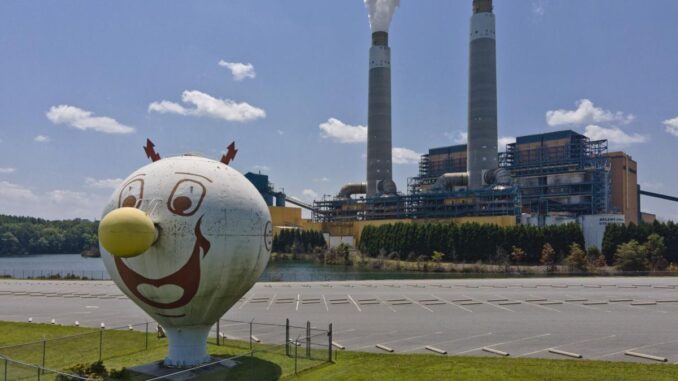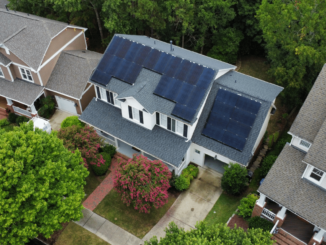
Once the scourge of environmentalists for its radioactive waste, nuclear power is now “clean” in North Carolina.
At least that’s the view of state law after both chambers of the General Assembly on Tuesday overrode Gov. Roy Cooper’s veto of energy-related legislation passed in September.
The designation sets the stage for Duke Energy’s plan to make its Belews Creek Steam Station in Stokes County the first new nuclear power plant in the state since 1987, and rides a resurgent interest in atomic energy as a consistent generator of emissions-free electricity regardless of how hard the wind blows and when the sun shines.
“You can’t get a more reliable, cleaner, low-carbon-producing energy source than nuclear,” Republican Rep. Dean Arp of Union County argued Tuesday during debate before the override vote.
Nuclear plants don’t produce heat-trapping pollution that contributes to climate change the way those that burn fossil fuels do. But emissions shouldn’t be the exclusive measuring stick for the environmental impact of energy generation, argued Rep. Pricey Harrison, a Guilford County Democrat.
“Nuclear waste — we have no spot for it (and) it lasts for thousands of years, so it really isn’t clean energy,” she said.
Because there are no federally approved repositories for spent nuclear fuel, the U.S. has paid more than $9 billion to utilities — including Duke Energy in North Carolina — to store the radioactive waste in cooling pools and concrete containers at the power plants where it was generated.
About 88,000 metric tons of spent fuel is scattered among 77 sites in 35 states, including three Duke facilities in North Carolina.
Atomic affirmation
With Tuesday’s override, state statutes now will refer to “clean” energy rather than “renewable” energy when referencing emissions-free electricity generation.
Sen. Paul Lowe of Forsyth County was the only Senate Democrat to back the bill, although he voted against the override Tuesday.
Eight Democrats in the House supported the legislation, and five eventually sided with the Republican majority in the successful override.
The new language effectively affirms nuclear as an option for Duke Energy in its plan to meet state-mandated standards to slash climate-impacting pollution from electricity production 70% by 2030 compared to 2005 levels and reaching “carbon-neutral” status by the middle of the century.
“(The bill) highlights nuclear’s critical importance as a carbon-free resource in our ‘all of the above’ strategy (for meeting emissions goals), and we remain committed to moving forward with exploring the potential for an advanced nuclear facility that brings jobs, new investment and clean energy to our Belews Creek facility in Stokes County,” Duke spokesman Bill Norton said in an email to the Journal Tuesday.
The legislation also lifts some requirements related to the construction of nuclear facilities and expands what the N.C. Utilities Commission must consider before approving power projects, including energy availability and capacity, as well as the costs of maintenance and decommissioning.
Nuclear facilities can generate large amounts of energy around the clock while solar and wind power are subject to the cycles and whims of nature. Solar panels and wind turbines also have lifespans of about a quarter-century.
“I think (the law’s language) just facilitates the expansion of nuclear, which we know is not cost-effective especially when you compare it to energy efficiency and the other investments that have directly benefited every single county in the state and the state’s economy,” Harrison said.
The shift
At 50-year-old Belews Creek, nuclear generation would replace power currently produced by the burning of coal and natural gas, which emit heat-trapping carbon dioxide, the leading contributor to human-caused climate change.
The transition would involve the addition of so-called small modular reactors that can be built in a factory and shipped in pieces to their ultimate destinations, allowing for a gradual ramp-up in generating capacity to 300 megawatts.
Duke’s 11 existing nuclear units at 11 sites in North and South Carolina average about 1,000 megawatts.
The company plans to apply for Nuclear Regulatory Commission approval for the Belews Creek project in 2025, with construction commencing around 2030 and production beginning sometime from the mid-2030s into the 2040s.
ENB Top News
ENB
Energy Dashboard
ENB Podcast
ENB Substack



